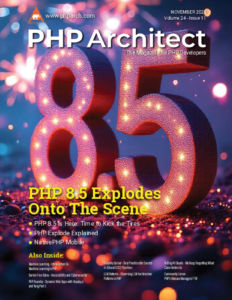The May issue of php|architect is free!
 The May issue of php|architect has been published and is available for download, free of charge, directly from our website to all registered users (not a registered user? You can register directly from the magazine page above).
The May issue of php|architect has been published and is available for download, free of charge, directly from our website to all registered users (not a registered user? You can register directly from the magazine page above).
This month’s issue is dedicated to PHP on Windows—a topic on which it is often difficult to find good information. Additionally, we have great pieces from our columnists on topics ranging from security to quality assurance and a great interview with Zend Framework lead Matthew Weier O’Phinney.
Contents
Here’s a quick overview of this month’s contents:
- Installing PHP on Windows by Hank Janssen and Pierre A. Joye
The Windows version of PHP has always lagged behind the other platforms in terms of features and stability, however, the situation has improved drastically during the last six or so months, with PHP on Windows reaching feature parity with other platforms. Developing with PHP on Windows is now easier than ever and, in some cases, has resulted in important PHP innovations. Learn how you can set up a development environment to compile and develop PHP on Windows within minutes.
- Introduction to Silverlight and the HTML DOM by Joe Stagner
This article is intended to serve as an introduction to Microsoft Silverlight for developers that are probably not .NET developers. Learn how to get started integrating your PHP apps with the Silverlight features.
- Configure and Optimize PHP on Windows by Ruslan Yakushev and Hank Janssen
It has been pretty hard in the past to figure out how to install and configure PHP on Windows. Additionally, when you did get it installed, finding information on how to optimize PHP was even harder to find. Due to the recent work done by the PHP Community and Microsoft, doing exactly that is now easier than ever.
- Pre-Launch Checklist by Eric David Benari
Shortly after most new sites are launched, the creators discover that some necessary elements have been forgotten. Pilots employ a pre-flight checklist to avoid problems while airborne, so it is only natural that web sites should have a pre-launch checklist to avoid problems once users begin visiting the site.
- Getting Started with the SQL Server Driver for PHPby David Sceppa
Microsoft recently produced a PHP extension to communicate with SQL Server 2005 and 2008 databases, the SQL Server Driver for PHP. This article will cover the basic workings of this new extension, demonstrating how to connect to SQL Server, execute queries, retrieve results and manage transactions.
- Security Roundup: The Cost of Security by Arne Blankerts
Take a look at the costs of securing your code up front or repairing it later. What are the actual costs, and what are the questions you need to ask yourself when deciding?
- PEAR Corner: Quality Assurance Teams—Truth or Myth? by Helgi Þormar Þorbjörnsson
In the last couple of years, there seems to be a growing trend in the PHP world where application and library developers put out claims that their piece of code is high-quality and thoroughly tested. Indeed, in many cases, this is more than true, but how can you really guarantee quality like this?
- Collecting Garbage: Cleaning Up by Derick Rethans
In this second part of the three-part column on the new garbage collecting mechanism in PHP 5.3, we’ll dive into a solution to the problem with circular references.
- Enterprise PHP: The Rise of Frameworks
by Ivo Jansch Frameworks are more popular than ever, and
seem to have replaced the CMS as the implementation of choice for websites. In this article, Ivo interviews Matthew Weier O’Phinney, software architect for Zend Framework, on several topics, such as the reasons why frameworks are so popular.
- exit(0): Thinking in Circles by Marco Tabini
When the budget is tight and we have to develop for multiple
browsers and platforms, creativity loses out.






Leave a comment
Use the form below to leave a comment: